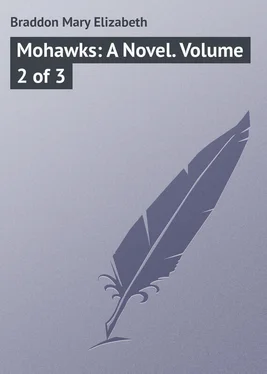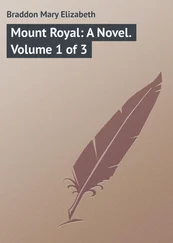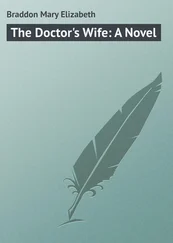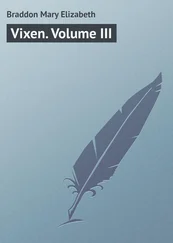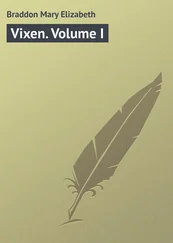Mary Braddon - Mohawks - A Novel. Volume 2 of 3
Здесь есть возможность читать онлайн «Mary Braddon - Mohawks - A Novel. Volume 2 of 3» — ознакомительный отрывок электронной книги совершенно бесплатно, а после прочтения отрывка купить полную версию. В некоторых случаях можно слушать аудио, скачать через торрент в формате fb2 и присутствует краткое содержание. Жанр: foreign_prose, на английском языке. Описание произведения, (предисловие) а так же отзывы посетителей доступны на портале библиотеки ЛибКат.
- Название:Mohawks: A Novel. Volume 2 of 3
- Автор:
- Жанр:
- Год:неизвестен
- ISBN:нет данных
- Рейтинг книги:3 / 5. Голосов: 1
-
Избранное:Добавить в избранное
- Отзывы:
-
Ваша оценка:
- 60
- 1
- 2
- 3
- 4
- 5
Mohawks: A Novel. Volume 2 of 3: краткое содержание, описание и аннотация
Предлагаем к чтению аннотацию, описание, краткое содержание или предисловие (зависит от того, что написал сам автор книги «Mohawks: A Novel. Volume 2 of 3»). Если вы не нашли необходимую информацию о книге — напишите в комментариях, мы постараемся отыскать её.
Mohawks: A Novel. Volume 2 of 3 — читать онлайн ознакомительный отрывок
Ниже представлен текст книги, разбитый по страницам. Система сохранения места последней прочитанной страницы, позволяет с удобством читать онлайн бесплатно книгу «Mohawks: A Novel. Volume 2 of 3», без необходимости каждый раз заново искать на чём Вы остановились. Поставьте закладку, и сможете в любой момент перейти на страницу, на которой закончили чтение.
Интервал:
Закладка:
"Nothing like a long war for enriching clever tradesmen," said Chevenix. "Now, I really think it very estimable in Topsparkle, considering his low origin, that he manages to pass for almost a gentleman."
"I know he is much genteeler than many of us, and far more courteous," said Bolingbroke.
"Ah, that is his chief mistake. He overdoes the courtly air. He is monotonous in his gentility, and has none of the easy variety which belongs to high breeding. He has all the faults of a novice in the art of good manners."
That refined air and superficial polish, which satisfied society at large, revolted Lord Lavendale. He hated mincing manners in any man, but most of all in Vyvyan Topsparkle. He hated the man's small white hands and smooth feminine tones of voice, hated his pencilled eyebrows and white-lead complexion, his slim waist and attenuated legs.
He told himself that this aversion of his was but a natural instinct, an innate revulsion of the mind at the aspect of hidden sin; yet in his heart of hearts it was as Judith's husband he hated this man. He thought of him as her owner, the wretch who had bought her with his fortune, who held her captive by the malignant power of his ill-gotten wealth – who in the privacy of domestic life might insult and bully her, for anything Lavendale knew to the contrary. That smooth Janus countenance had doubtless its darker side; and he who in public was ever the adoring husband might be a tyrant in private.
Stimulated by this ill-feeling, Lavendale was more than ever bent on ferreting out the secret of Mr. Topsparkle's early life, and the fate of that Italian mistress whom he had for a little while acknowledged as his wife. He had exhausted all his own and Philter's powers of research, and had come by no proof or even circumstantial evidence of guilt. There was but one person likely to know all Mr. Topsparkle's secrets, and he would be unlikely to reveal them. That person was Fétis, the confidential valet, whom Lavendale had met sometimes in the corridors at Ringwood Abbey, looking the very essence of discretion and respectful dumbness.
"Difficult to get a man to speak when all his interests are in favour of silence," thought Lavendale.
He communicated his perplexities to his friend Durnford. Since his lordship's renunciation of Irene they were more brotherly together than ever they had been.
"And I, too, am devoured with curiosity about Topsparkle's past life," said Herrick; "that hidden picture with its strange likeness to the girl I love has mystified me consumedly. 'Tis but a chance likeness, of course, since we can trace Irene's lineage into the remote past without coming upon any track of an Italian marriage. I have examined the Bosworth family-tree – you must have noticed it framed and glazed in the dining-parlour – and there is not a foreign twig in all its ramifications. Yet when I ponder on my dear one's passion for music, her ardent impulsive temperament, her southern style of beauty, I am at a loss to comprehend how that sober British tree can have put forth so bright a flower. In any case I should like to know more about that lovely girl whose picture is hidden in Mr. Topsparkle's sanctum. By his pallor when he caught us looking at the portrait, one might guess he has painful memories of the original."
Lady Tredgold carried her niece back to London, and Irene reëntered the glittering circle of fashion and folly, and mixed with women among whom high principles and virtuous inclinations were as exceptional as the Pitt diamond among gems. The rage for play had spread like a leprous taint through the whole fabric of society. Women sat night after night squabbling over cards, and were ready to stab each other with the golden bodkins they wore in their hair, if Spadillio was unkind, or Manillio in the hand of an adversary. Lady Tredgold was an inveterate gamester, but dared not play high, and was fain to affect the society of ladies of limited means, who could only afford to ruin themselves and their families in a small way. Yet if her losses were not large, her temper suffered as severely as if she had been losing thousands; while she was careful not to parade her winnings before her lean and hard-featured daughters, who had something of the harpy in their natures, and were always pestering their mother for new clothes or pocket-money. They, too, were fond of cards, despite the awful example furnished by their parent; they, too, had their losses, which had to be supplied somehow. Card-money was in those days a necessity of fashionable existence. Better to be buried alive in some rustic vicarage, combing lap-dogs and reading Mrs. Behn or Mrs. Manly, than to be launched in a London drawing-room with an empty purse.
Rena, whose purse was always full, declined to play, whereupon she was characterised as cold and proud and witless, a beautiful nonentity, a woman altogether wanting in spirit.
"You should gamble, child; 'tis the only excitement in life," said Lady Judith, tapping the heiress on the cheek at a fine house in Gerard Street, where the tables were set for ombre and basset.
"It is an excitement that seems to make nobody happy, madam," answered Rena quietly. "So I would as soon be dull."
"What a prude your heiress is!" Judith said to Lavendale, a few minutes after: "she glides about a room looking as if she were a being of superior mould, and had nothing in common with mortals."
"She is but a child just escaped from the nursery," answered Lavendale lightly, "and doubtless her soul is overwhelmed with wonder."
"Nay, I would not mind if she were shy and abashed among us," retorted Judith, "for I admit that we are somewhat startling to a novice. It is her impertinent assurance which annoys me. That calm half-unconscious air of superiority would provoke a saint."
"If there were any saints in our set to be provoked," said Lavendale; "but I don't think there is anything saintly to be met with in a West End card-room."
"Look at her now, as she stands with her elbow leaning on yonder mantelpiece, not deigning even to pretend to listen to Mr. Dapperwit's compliments. I wonder, for my part, that he wastes his cleverness upon a creature of ice. Where did she get that cold impregnable air?"
"From the gods, whose daughter she should be, if looks could vouch for a pedigree," answered Lavendale, delighted to tease the woman he adored.
"O, I beg your lordship's pardon," said Judith, with a curtsy. "I forgot for the moment that I was criticising the future Lady Lavendale."
"Don't apologise. We are not plighted yet, and that impregnable air of Mrs. Bosworth may keep me off as well as her other lovers."
"What, are you not engaged yet?"
"No, nor ever likely to be, Judith, as you know very well."
They were in a doorway between a secondary drawing-room and a third room still smaller – jostled and hemmed in by the crowd. He could snatch her hand and clasp it for a moment unperceived. Their eyes met as the crowd drifted them nearer, met in fond entanglement, and Judith's alabaster bosom glowed with a sudden blush like the crimson light of a winter dawn reflected upon snow. It was but an instantaneous betrayal of passionate feeling on either side; yet from that moment the possibility of pretence or concealment was over. Each knew that the old fires still burned. Light words and lighter laughter and all the studied arts of coquetry could henceforward avail nothing.
The crowd which had drifted them together speedily jostled them apart; Lady Judith passed on in a bevy of fashion and chatter, talking as loud as her friends, and with just as much elegant inanity.
Everybody decided that evening that Irene was dull. A pity that so much beauty and wealth should be thrown away upon a simpleton. She had not even that hoydenish audacity, that knack of saying improper things innocently, which could alone make simplicity interesting to well-bred people. She was not in the least amusing. She was only beautiful: and one might say as much of a statue.
Читать дальшеИнтервал:
Закладка:
Похожие книги на «Mohawks: A Novel. Volume 2 of 3»
Представляем Вашему вниманию похожие книги на «Mohawks: A Novel. Volume 2 of 3» списком для выбора. Мы отобрали схожую по названию и смыслу литературу в надежде предоставить читателям больше вариантов отыскать новые, интересные, ещё непрочитанные произведения.
Обсуждение, отзывы о книге «Mohawks: A Novel. Volume 2 of 3» и просто собственные мнения читателей. Оставьте ваши комментарии, напишите, что Вы думаете о произведении, его смысле или главных героях. Укажите что конкретно понравилось, а что нет, и почему Вы так считаете.
